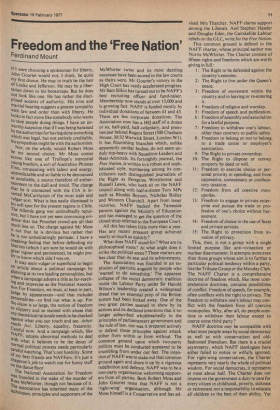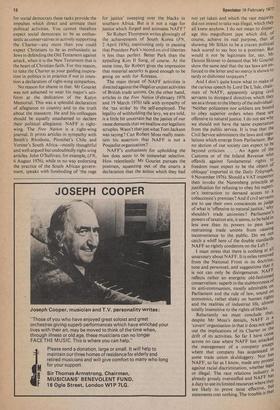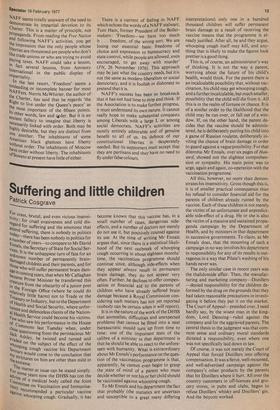Freedom and the 'Free Nation'
Ferdinand Mount If I were choosing a spokesman for liberty, John Gouriet would not, I think, be quite mY first choice. He may in truth be the heir of Locke and Jefferson. He may be a libertarian down to his bootstraps. But he does not look like one. He has rather the disciWined accents of authority. His trim and martial bearing suggests a greater sympathy With law and order than with liberty. He looks in fact more like somebody who wants 1° stop people doing things. I have an unworthy suspicion that if I was being harassed by the authorities for having done something Which was legal, but not entirely creditable, his sYmpathies might be with the authorities. Nor, on the whole, would Robert Moss be mY second choice. Mr Moss comes across like one of Trollope's mercurial Young hustlers, a sort of Australian Phineas Finn, coruscating with talent and energy, unpredictable and so liable to be denounced as unreliable, a source therefore of embarrassment to the dull and timid. The charge that he is connected with the CIA is inverted McCarthyism of the most stale and vulgar sort. What is less easily dismissed is hIS soft spot for the present regime in Chile. • The Allende gang was undoubtedly repulsive, but I have not yet seen convincing evidence that the Pinochet crowd are all that much less so. The charge against Mr Moss IS not that he is devious but rather that he is too unhesitatingly partisan. I have a sneaking feeling that before defending my liberties (which I am sure he would do with great vigour and persistence), he might prefer to know which side I was on. It may seem vulgar or superficial to begin an article about a political campaign by glancing at its two leading personalities, but hen a campaign adopts a title as far-reach and imprecise as the National Associa!Ion For Freedom, we must, at least in part, Judge by appearances—and that includes Personalities—to find out what is up. For the claim is so large, the notion of freedom SO Slippery and so stained with abuse that anY theoretical rationale needs to be checked against what you can touch and sec. Arbeit frei. Liberty, equality, fraternity. Nareful now. And a campaign which, like :AFF, adopts abnormal methods to deal with what it believes to be the decay of normal political process needs particularly careful watching. That's not hostility. Some my best friends are NAFFers. It's just a chaperon's job to watch out for funny stuff on the dance floor. The National Association for Freedom aS founded in the wake of the murder of McWhirter, though not because of it. II he association has inherited many of the echniques, principles and supporters of the McWhirter twins and its most dazzling successes have been scored in the law courts as theirs were. Mr Gouriet's victory in the High Court has vastly accelerated progress. Mr Sam Silkin has turned out to be NAFF's best recruiting officer and fund-raiser. Membership now stands at over 15,000 and is growing fast. NAFF is funded mostly by individual donations of between £1 and £5. There are few corporate donations. The Association now has a HQ staff of a dozen or so, half-paid, half-voluntary, and premises just behind Regent Street (500 Chesham House, 30/32 Warwick Street, London WI). It has flourishing branches which, unlike apparently similar bodies, do not seem unduly top-heavy with Squadron-Leaders and Rear-Admirals. Its fortnightly journal, the Free Nation, is written in a robust and sophisticated style, numbering among its contributors such distinguished journalists of the Right as Peregrine Worsthorne and Russell Lewis, who both sit on the NAFF council along with half-a-dozen Tory MPs such as Rhodes Boyson, Nicholas Ridley and Winston Churchill. Apart from lesser victories, NAFF backed the Tameside parents against the Ministry of Education and has managed to get the question of the closed shop referred to the European Court. All this has taken little more than a year. Has any recent pressure group achieved nearly so much so quickly?
What does NAFF stand for? What are its philosophical roots? At what angle does it strike the political scene? These matters are less clear than its zest and its achievements.
The Association was founded in an explosion of patriotic anguish by people who 'wanted to do something.' The apparent collapse of the social democratic tradition inside the Labour Party under Sir Harold Wilson's leadership created a widespread dread that an essential prop of the British system had been kicked away. One of the two great parties seemed to show by its actions and its declared intentions that it no longer subscribed wholeheartedly to the principles of parliamentary government and the rule of law, nor was it prepared actively to defend those principles against attack either from within or from without. The common ground upon which two-party politics must be conducted appeared to be crumbling from under our feet. The intention of NA FF was to stake out that common ground again and shore it up by a vigorous redefinition and defence. NAFF was to be a non-party organisation welcoming supporters from all parties. Both Robert Moss and John Gouriet insist that NAFF is not a 'right-wing' organisation, although Mr Moss himself is a Conservative and has ad vised Mrs Thatcher. NAFF claims support among the Liberals. And Stephen Haseler and Douglas Eden, the Gaitskellite Labour rebels on the G LC, write for the Free Nation. This common ground is defined in the NAFF charter, whose principal author was Norris McWhirter. The Charter consists of fifteen rights and freedoms which are worth giving in full:
I: The Right to be defended against the country's enemies.
2: The Right to live under the Queen's peace.
3: Freedom of movement within the country and in leaving or re-entering it.
4: Freedom of religion and worship. 5: Freedom of speech and publication. 6: Freedom of assembly and association fora lawful purpose. 7: Freedom to withdraw one's labour, other than contrary to public safety. 8: Freedom to belong or not to belong to a trade union or employer's association.
9: The Right to private ownership.
10: The Right to dispose or convey property by deed or will. 11 : Freedom to exercise choice or personal priority in spending, and from oppressive, unnecessary or confiscatory taxation. 12: Freedom from all coercive monopolies.
13: Freedom to engage in private enterprise and pursue the trade or profession of one's choice without harassment.
14: Freedom of choice in the use of State and private services. 15: The Right to protection from invasion of privacy.
This, then, is not a group with a single limited purpose like anti-vivisection or nuclear disarmament. It attempts more even than those groups whose aim is to further a particular political tendency within a party, like the Tribune Group or the Monday Club. The NAFF Charter is a comprehensive doctrine of freedom which, like most comprehensive doctrines, contains possibilities of conflict. Freedom of speech, for example, often conflicts with the right to privacy. The freedom to withdraw one's labour may conflict with the freedom from all coercive monopolies. Why, after all, do people combine to withdraw their labour except to coerce some third party? NAFF doctrine may be compatible with what most people mean by social democracy as well as with conservatism and oldfashioned liberalism. But there is a crucial asymmetry, which NAFF ideologues have either failed to notice or wilfully ignored. For right-wing conservatives, the Charter represents very nearly the whole of political wisdom. For social democrats, it represents at most about half. The Charter does not impose on the government a duty to care for every citizen in childhood, poverty, sickness or retirement nor a responsibility to educate all children to the best of their ability. Yet
for social democrats these tasks provide the impulses which direct and animate their political activities. You cannot therefore expect social democrats to be as enthusiastic as conservatives in actively supporting the Charter—any more than you could expect Christians to be as enthusiastic as Jews in defending the Old Testament against attack, when it is the New Testament that is the heart of Christian faith. For this reason, to take the Charter as your guiding inspiration in politics is in practice if' not in intention a declaration of right-wing sympathies.
No reason for shame in that. Mr Gouriet was not ashamed to wear his major's uniform at the dedication of the Katyn Memorial. This was a splendid declaration of allegiance to country and to the truth about the massacre. He and his colleagues should be equally unashamed to declare their political allegiance. NAFF is rightwing. The Free Nation is a right-wing journal. It prints articles in sympathy with Smith's Rhodesia, Pinochet's Chile and Vorster's South Africa—mostly thoughtful and well-argued but undoubtedly right-wing articles. John O'Sullivan, for example, (FN, 6 August 1976), while in no way endorsing the practice of the South African government, speaks with foreboding of 'the rage
for justice' sweeping over the blacks in southern Africa. But is it not a rage for justice which forged and animates NAFF?
Sir Robert Thompson writes glowingly of the achievements of South Korea (FN, 2 April 1976), mentioning only in passing that President Park's record on civil liberties is less than perfect. Better Park than the appalling Kim II Sung, of course. At the same time, Sir Robert gives the impression that material security is good enough to be going on with for Koreans.
The main thrust of NAFF activities is directed against the illegal or unjust activities of British trade unions. On the other hand, articles in the Free Nation (February 1976 and 19 March 1976) talk with sympathy of the 'tax strike' by the self-employed. The legality of withholding the levy, we are told, is a little bit uncertain but the justice of our cause demands that we swallow our legalistic scruples. Wasn't that just what Tom Jackson was saying? Can Robert Moss really maintain his assertion that NAFF is not a Poujadist organisation ?
NA FF's enthusiasm for upholding the law does seem to be somewhat selective. How relentlessly Mr Gouriet pursues the postmen, squeezing out of the courts a declaration that the action which they had
not yet taken and which the vast majority did not intend to take was illegal, which they all knew anyhow. I do not mean to disparage this magnificent jape which did, of' course, achieve its real purpose, that of showing Mr Silkin to be a craven political hack scared to say boo to a postman. But would it not be legitimate for, say, Mr Dennis Skinner to demand that Mr Gouriet show the same zeal that the tax laws are enforced to the letter and no mercy is shown to tardy or dishonest taxpayers? And I don't quite know what to make of the curious speech by Lord De L'Isle, chairman of NAFF, apparently urging civil servants to disregard directives which they see as a threat to the liberty of the individual: `Neither policemen nor soldiers are bound to obey superior orders when these are offensive to natural justice. I do not see whY we should not have the same expectation from the public service. It is true that the Civil Service administers the laws and regulations which emerge from Parliament. But no section of our society can expect to be beyond criticism . . . An Agent of the Customs or of the Inland Revenue vo'll° offends against fundamental rights to freedom must expect to be the object of obloquy' (reported in the Daily TelegraPh, 9 November 1976). Should a VAT inspector then invoke the Nuremberg principle as justification for refusing to obey his superior's instruction to demand access to 3 tobacconist's premises ? And if civil servants are to use their own consciences as judge of what is 'offensive to natural justice,' wh,Y shouldn't trade unionists? Parliament s powers of taxation are, it seems, to be held in less awe than its powers to pass laws restraining trade unions from causing inconvenience to the public. Do we not catch a whiff here of the double standards NAFF so rightly condemns on the Left ? I must stress that there is nothing at all unsavoury about NAFF. It is miles removed from the National Front in its doctr, tone and personnel, and suggestions that it is not can only be disingenuous. NAFF reflects rather an energetic old-fashioned, conservatism: superb in the stubbornness 01 its anti-communism, mostly admirable o° Parliament and the rule of law, sound on economics, rather shaky on human rights and the realities of industrial life, almost totallyinsensitive to the rights of blacks.
Reluctantly we must conclude that,
despite Mr Moss's denials, NAFF ?, 'covert' organisation in that it does not sPell out the implications of its Charter or the drift of its activities. So far I have corne. across no case where NAFF has attackedt the management of a company eKceP. where that company has acquiesced 01 some trade union skulduggery. Nor has, NAFF, so far as I know, made any Pr°Iesi, against racial discrimination, whether leg a.1 or. illegal. The race relations industry is already grossly overstaffed and NAFF has a duty to use its limited resources where they are likely to prove most effective, NI, statements cost nothing. The trouble is thal NAFF seems totally unaware of the need to demonstrate its impartial devotion to its Charter. This is a matter of principle, not PruPaganda. From reading the Free Naiion and following NA FF's activities, You get the impression that the only people whose liberties are threatened are people who don't like trade unions or who are trying to avoid Paying taxes. NAFF could take a lesson, in fact several lessons, from Amnesty International in the public display of imPartiality. In the last resort, 'Freedom' seems a misleading or incomplete banner for most NAFFers. Norris McWhiner, the author of the Charter, has said that he regards 'the Right to live under the Queen's peace' as the most important of the fifteen points. In other words, law and qrder. But it is an ancient
fallacy to imagine that liberty is
necessarily linked with order. Both may be highly desirable, but they are distinct from °tie another. The inhabitants of some American black ghettoes have liberty Without order. The inhabitants of Moscow have order without liberty. The inhabitants °I'Soweto at present have little of either.
There is a current of feeling in NAFF which echoes the words of a NAFF stalwart, Tom Ham, former President of the Boilermakers: 'Freedom—we have too much b . . . freedom, of the wrong sort. We are losing our essential basic freedoms of choice and expression to bureaucracy and state control, while people are allowed, even encouraged, to get away with murder' (FN, 26 November 1976). This approach may be just what the country needs, but it is not the same as modern liberalism or social democracy, and it is foolish or dishonest to pretend that it is.
NAFF's success has been so breakneck that it has not had time to stop and think. If the Association is to make further progress, it must understand its own nature. It cannot really hope to make substantial conquests among Liberals with a large L or among social democrats. NAF'F's activities are mostly entirely admirable and of genuine benefit to all of us. Its defence of our constitutional liberties is desperately needed. But its supporters must accept that they are partisans and they have no need to fly under false colours.




































 Previous page
Previous page